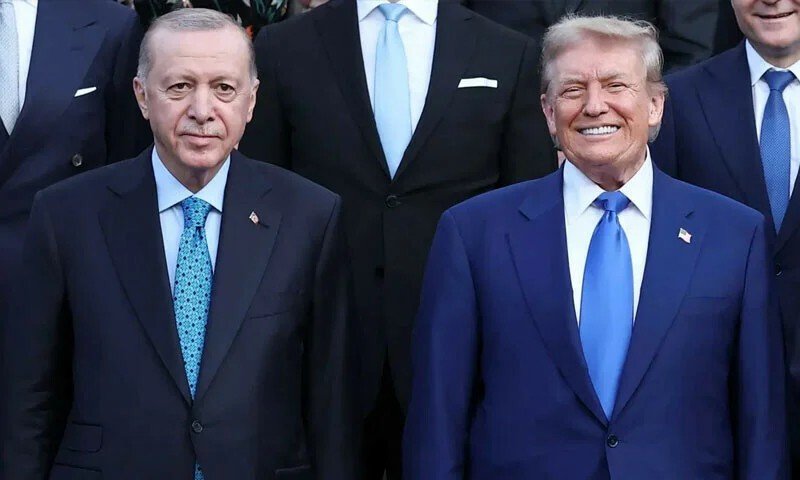
In a surprising turn of international diplomacy, former U.S. President Donald Trump and Turkish President Recep Tayyip Erdoğan held a high-profile meeting in The Hague this week. The leaders came together on the sidelines of a multilateral security summit to discuss ongoing tensions in the Middle East, most notably the recently announced ceasefire between Iran and Israel.
Their joint appearance marks a rare moment of convergence between two leaders known for their strong-willed foreign policies and often-controversial international stances. Both expressed strong support for the ceasefire, which came into effect following weeks of deadly escalation and a highly volatile standoff between Tehran and Tel Aviv.
A Symbolic Setting
The meeting, which took place at the Peace Palace in The Hague—a site often associated with international law and diplomacy—carried deep symbolic significance. At a time when global attention remains sharply focused on the humanitarian consequences of the Iran-Israel conflict, Erdoğan and Trump appeared eager to present a united front in support of peace efforts.
President Erdoğan welcomed the ceasefire as a “positive and overdue step” toward regional de-escalation. “It is critical that all parties now prioritize dialogue over aggression,” Erdoğan said during a joint press appearance. “Turkey has always advocated for regional stability and will continue to work with international partners, including the United States, to ensure this ceasefire holds.”
Trump echoed the sentiment, praising what he called a “tremendous diplomatic achievement.” “We were very close to a catastrophe,” he said. “But strong leadership and swift action have helped avoid what could have been a massive war.”
Ceasefire Amid Chaos
The ceasefire, which was announced late last week, followed a sudden pivot in U.S. policy. After initially authorizing airstrikes in response to a suspected Iranian drone attack on a U.S. base in Qatar, Trump shifted gears and reportedly brokered back-channel negotiations that led to a temporary cessation of hostilities.
Though the truce has largely held so far, scattered reports of clashes in Gaza and the Golan Heights suggest that the situation remains fragile. Nevertheless, the commitment shown by both American and Turkish leadership has drawn cautious optimism from international observers.
Turkey’s Mediating Role
Turkey has long sought to position itself as a key regional power broker, leveraging its geographic location and historical ties to both Western and Middle Eastern nations. Erdoğan’s appearance with Trump signals Ankara’s desire to reassert its diplomatic relevance in the face of growing instability in the region.
Sources close to the Turkish delegation suggest that Erdoğan offered to facilitate further negotiations between Israel and Iran—two nations with no formal diplomatic ties. While the offer was not confirmed publicly, it underscores Ankara’s increasing interest in playing a peacemaking role, particularly as regional tensions threaten broader economic and security dynamics.
A Broader Conversation
Beyond the immediate ceasefire, the two leaders also discussed the broader implications of the conflict, including the humanitarian crisis in Gaza, the status of U.S. military bases in the region, and renewed defense cooperation between Turkey and NATO allies.
According to briefings from both sides, Erdoğan raised concerns about the militarization of regional disputes and reiterated Turkey’s stance that a two-state solution for the Israeli-Palestinian conflict remains essential for lasting peace. Trump, meanwhile, focused on rebuilding U.S. influence in the Middle East, positioning himself as a stabilizing force ahead of the upcoming U.S. elections.
Critics and Caution
While the meeting was hailed by some as a diplomatic success, critics argue that the ceasefire may be too little, too late. With hundreds dead and thousands displaced, questions remain about the long-term sustainability of the truce. Others question whether Trump, no longer holding public office, can legitimately influence U.S. foreign policy.
Nevertheless, the optics of the meeting—two powerful figures calling for restraint and diplomacy in a region scarred by decades of war—provided a welcome, if temporary, reprieve from the drumbeat of conflict.
Looking Ahead
Whether the Iran-Israel ceasefire will hold remains to be seen. But for now, the Erdoğan-Trump summit signals that backdoor diplomacy and strategic partnerships can still play a role in averting greater disasters.
As global powers weigh their next moves, the sight of Turkish and American leaders standing together in The Hague offers a rare glimmer of hope in an increasingly uncertain world.
Reference: ترک صدر اور ڈونلڈ ٹرمپ کی دی ہیگ میں ملاقات، ایران-اسرائیل جنگ بندی کا خیرمقدم


